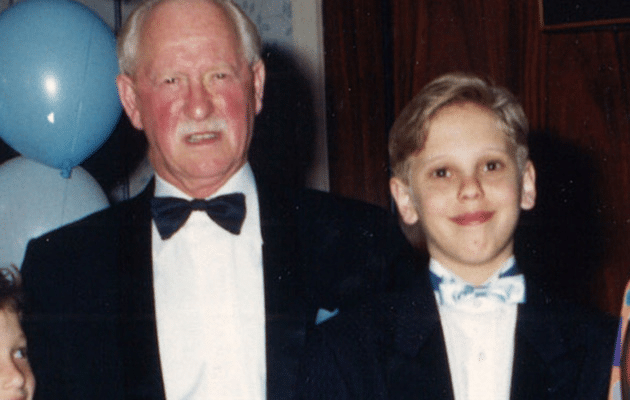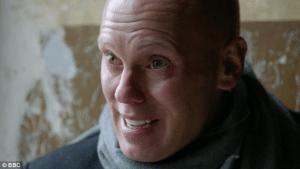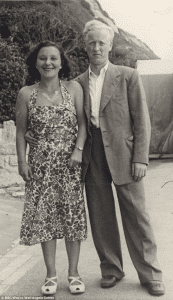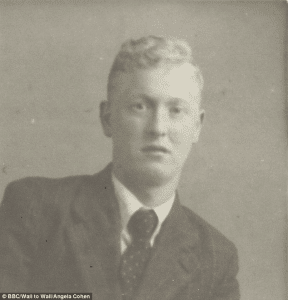Robert Rinder finds out about his family’s fate in a Nazi concentration camp during making of television programme

Old Elizabethan Robert ‘Judge’ Rinder experienced an emotional journey to the Nazi concentration camp where his grandfather, Morris Malenicky, was imprisoned in this week’s episode of the BBC One’s Who Do You Think You Are?
Polish-born Morris lost seven relatives – his parents, four sisters and a brother – in the Treblinka Camp in Poland in 1940 and he was the only one of his immediate family to survive the Holocaust.
In 1942, he had to register the deaths. The certificate, which is shown to Robert (pictured above at his Bar Mitzvah with his grandfather), reads: “Malenicky. Place of birth: Piotrkow, Poland. Circumstances of death: Four sisters, a brother, parents, Treblinka Camp. Gas chambers, crematorium.”
 At this point in the programme, Robert (OE 1989–1994) says: “Imagine writing that, how your four sisters, your brother and your parents were wiped out.”
At this point in the programme, Robert (OE 1989–1994) says: “Imagine writing that, how your four sisters, your brother and your parents were wiped out.”
In an interview with the TV Times, Robert explained why he wanted to take part in the programme: “So many of us are interested in understanding where we came from and I only had an outline that I wanted coloured in. But it’s also important that we all understand more about the Holocaust.”
Morris, who was a teenager at the time, escaped the fate of his family only because he was deemed strong enough for work: he was put into forced labour at a glass factory in Piotrkow, his home town. Later, he was sent to the Buchenwald and Schlieben camps in Germany and then to Theresienstadt in Czechoslovakia, which was liberated by the Russian Army three weeks after his arrival.
 After the war, he was brought to the UK by a Jewish charity, the Central British Fund. He later met and married Lottie, Robert’s grandmother. Morris died in London in 2001 at the age of 78.
After the war, he was brought to the UK by a Jewish charity, the Central British Fund. He later met and married Lottie, Robert’s grandmother. Morris died in London in 2001 at the age of 78.
During the programme, Robert is shown the house where Morris grew up in Piortrkow, the ruins of the glass factory, the Buchenwald camp and its sub-camp, Schlieben. At Schlieben, he meets one of his grandfather’s friends, Ben Helfgott, who tells him about the starvation they suffered there,
He told the TV Times: “…there was a biting cold and I imagined my grandfather there in ragged clothing. I met up with my grandfather’s friend, Ben, who had been with him there. The most powerful moment was when Ben said to me, ‘Let’s walk out of here together’. That changed my life.”
 Robert is also seen visiting Lake Windermere, where Morris arrived, and watches footage of the orphans’ journey to England. “As I approach Windermere, I imagine what my grandfather would have felt coming from the dankness and greyness of Schlieben into this – big sky, and green, verdant English loveliness.”
Robert is also seen visiting Lake Windermere, where Morris arrived, and watches footage of the orphans’ journey to England. “As I approach Windermere, I imagine what my grandfather would have felt coming from the dankness and greyness of Schlieben into this – big sky, and green, verdant English loveliness.”
Robert said he had spent a great deal of time with his grandfather, yet he had never really told the family what had happened. “…The Holocaust was an unforgettable shadow in the family as my grandfather would behave in eccentric and challenging ways because of what he’d been through.”
Overall, Robert described the experience of making the programme as “an amazing gift. They’d just been statistics before but I read details of how his siblings were good at school and that they loved performing and that breathed life into these young children for me.”
He told the TV Times that his plans for the coming months include more episodes of Judge Rinder and of the Crime Stories programme and, perhaps, a chat show as well.
